Shauhin blames himself for brutal Survivor blindside
Shauhin blames himself for brutal Survivor blindside

Shauhin Davari. Photo: CBS.
As the late, great business magnate Aristotle Onassis once said: “I have no friends and no enemies – only competitors.”
Shauhin Davari, the debate professor from California, seems to have taken Onassis’ advice to heart as he only blames himself for being stabbed in the back by his allies Joe and Kyle. He should have had a better read on the tribal politics.
John Powell: You got to relive everything last night watching it back. I’ve spoken to Survivor players and sometimes how those past emotions resurface. How did you feel watching everything play out?
Shauhin Davari: If you’ve watched me out there you know how important deep breaths are to me. If you’ve been paying attention — like even during a challenge — I sat down and was just like, yeah. So there were a lot of deep breaths last night, for sure, especially because a lot of my friends and family didn’t know what was happening. I kept it very, very, very close. I really only told one person so it was kind of a blindside for them too. They genuinely believed I was going to win the game.
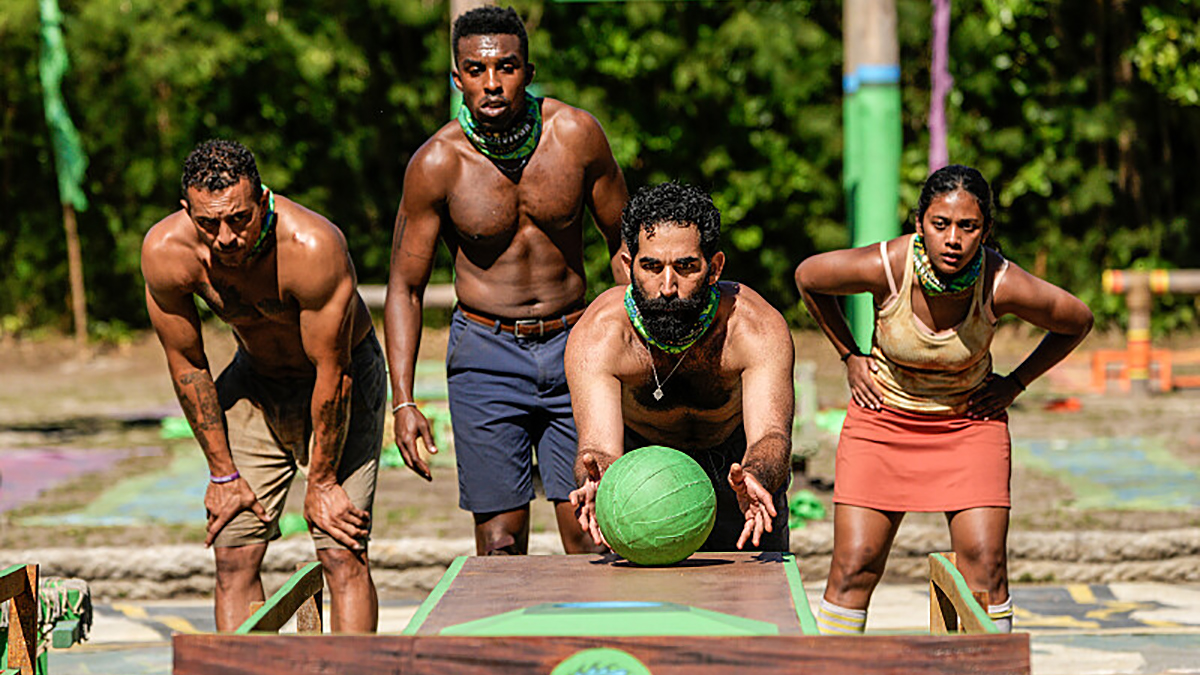
Joe Hunter, Kyle Fraser, Shauhin Davari and Kamilla Karthigesu. Photo: Robert Voets/CBS.
They were watching, and especially if you’re seeing it from my perspective — if you’re really paying attention to when I’m on the screen — you might think, Okay, this guy is playing a game where he could make strong arguments at the end. Watching my friends and family go through it was kind of brutal because I wanted it for them just as much as I wanted it for myself.
I want to represent my family, my friends, my community, Persian people, my speech and debate team. My speech kids are watching this — and I know that — so seeing me go home, seeing me not win the immunity challenge despite being in the lead again, that was heartbreaking for them.
Sometimes you also have to show that if the only outcome you’re happy with is winning the whole thing, then maybe you need to take a step back and understand the bigger picture of your life. Maybe you need to take a deep breath and realize how lucky you were just to be out there — not just once, but twice. I got to go out there twice, and I had an incredible experience surrounded by amazing people. These people are so cool.
Now I’m in the club. I get to watch it all back, and who knows — maybe they’ll call me again. I feel like I was entertaining and had a great time, and that opens up a world of opportunities. The Survivor fandom is so fun and so incredible. I’ve had an amazing time through this whole experience. So honestly, it was hard to be too bummed last night. It turned into a celebration, surrounded by the people I love.
John Powell: You mentioned “twice”. Please explain that briefly to the people who might not know what that refers to.
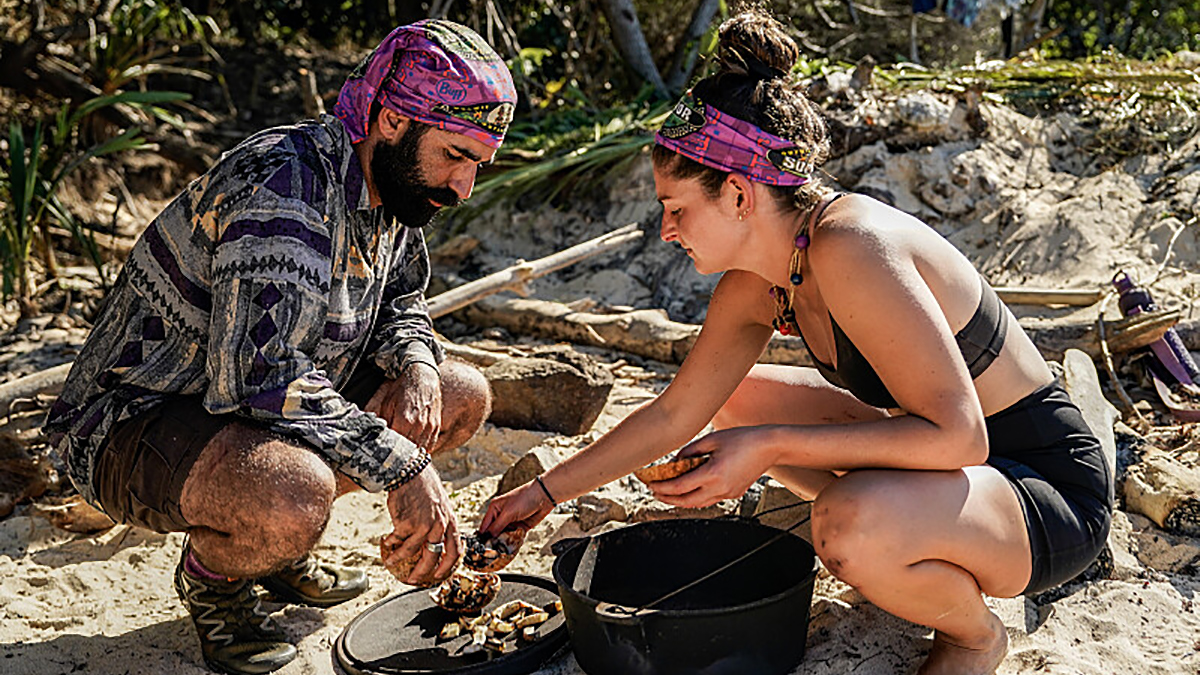
Shauhin Davari and Bianca Roses. Photo: Robert Voets/CBS.
Shauhin Davari: I was an alternate on Season 46, and then I came back for Season 48 — partially, I think… who knows — partly because I made quite an impact when I was out there as an alternate for 46, mostly just by smiling at people. Okay, no — what I actually did when I got out there was a lot of this [gestures to his face and beard]… and that alone was enough for people to be like, he’s suspect or I’m suspicious of him.
John Powell: But who could not be charmed by that smile? (laughs)
Shauhin Davari: I did learn a lot. I learned that, first of all, I don’t have to do much to get noticed. I really don’t need to do anything — people are going to notice me regardless. Just this little thing right here [gestures again to his face and beard] is enough to get people talking about me. So I realized: I don’t have to overdo it, right?
And people are naturally suspicious of me. So then the question becomes: What do I do to accommodate that? That natural suspicion people carry — especially in a game where suspicion runs rampant.
It’s something that’s helped me in my daily life too. I’ve come to understand that when I approach people, there’s often a baseline suspicion that already exists and a lot of that is shaped by media narratives. The media doesn’t show men like me on television being honest, having integrity, being cool — not being creepy, not being s—–y, not being a terrorist, not being a sleazy car salesman, not being all of those things.
That obviously weighed on me when I was out there. I wanted to represent myself in a way that helps future people like me — so they don’t get treated the way I’ve been treated my entire life. And so the question becomes: how do I slowly adjust that aura, that vibe, while still playing a winning game? That’s a tightrope to walk. And honestly, I’m proud of how I walked it.
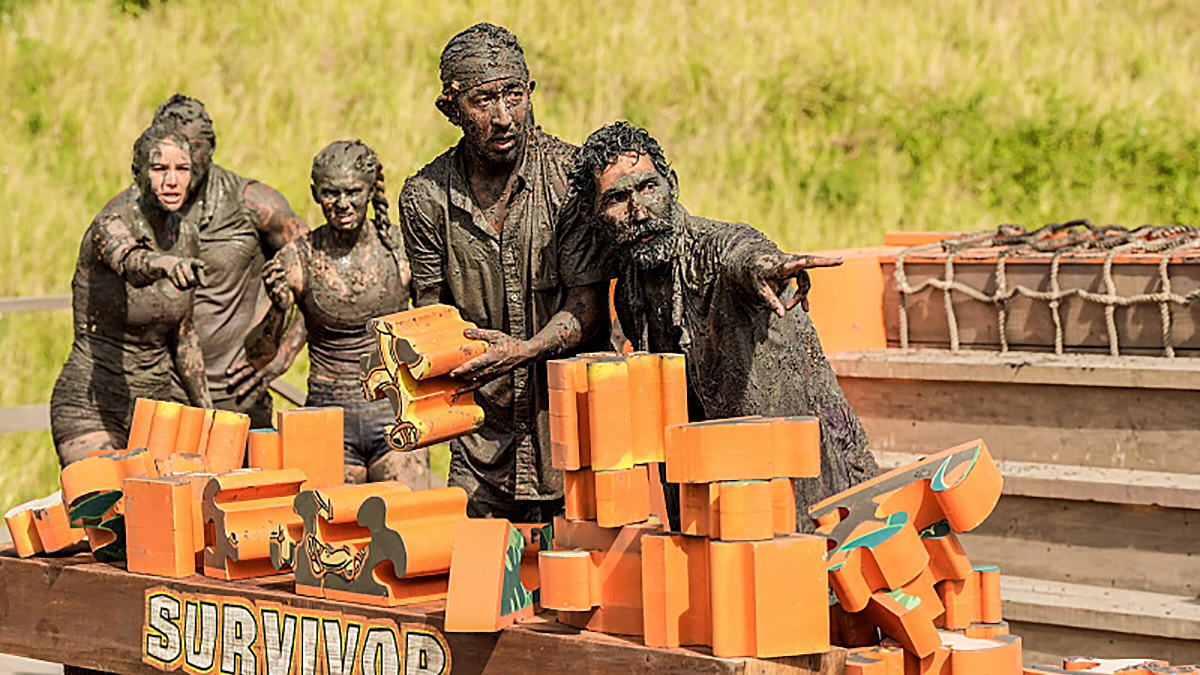
Shauhin Davari. — Photo: Robert Voets/CBS/
John Powell: If you were to assign any blame do you blame Kyle or do you blame Joe for your exit?
Shauhin Davari: I blame myself. That’s who I blame. I blame not understanding the shift — the wind — that was very clear around camp. The vibe had changed and I either wasn’t aware of it or I attributed it to the wrong thing.
It was kind of a perfect storm. Like I said earlier, Joe had just come off an extremely vulnerable moment — talking about his sister — and then that emotional wave crested when he saw the letters from his kid. That gave him the permission to really feel, to really open up and then he comes to me to have a serious conversation… and I’m talking about how someone pissed in his Cheerios. That’s not really the vibe.
That wasn’t the tone we had shared for 23 days. We had been so close the entire time and if you’re paying attention, you can see it.
Like, I wake Joe up and he’s not startled — because I had done that before. I did that every night. I’d wake him up in the middle of the night to have conversations. That’s how close we were. We were completely in sync the entire time — except for five hours. That’s it.
So, yeah — if that’s the case, I should have read the situation better. I should’ve pushed a little harder or at least approached it differently. I should’ve gotten after the details of what was really going on, but in a gentler way — with a man I knew was emotional, who I knew was sensitive, especially in that moment. And I didn’t meet that moment with the right energy. I didn’t meet the moment with the right vibe.
John Powell: To be to be fair, the conversation was very vague. Unless you knew all the moving parts behind the scenes it would hard to tell what he was getting at with you. I was thinking to myself watching it: Joe, why don’t you just ask what needs to be asked?
Shauhin Davari: ‘Why don’t you just ask what needs to be asked?’ That’s also on me. It’s very important for me in my life that I always take accountability for the mistakes that I make because you do not learn unless you take accountability. I want to learn from this experience. Survivor can teach you so much if you let it.
John Powell: What as your reaction when you found out about the lie?
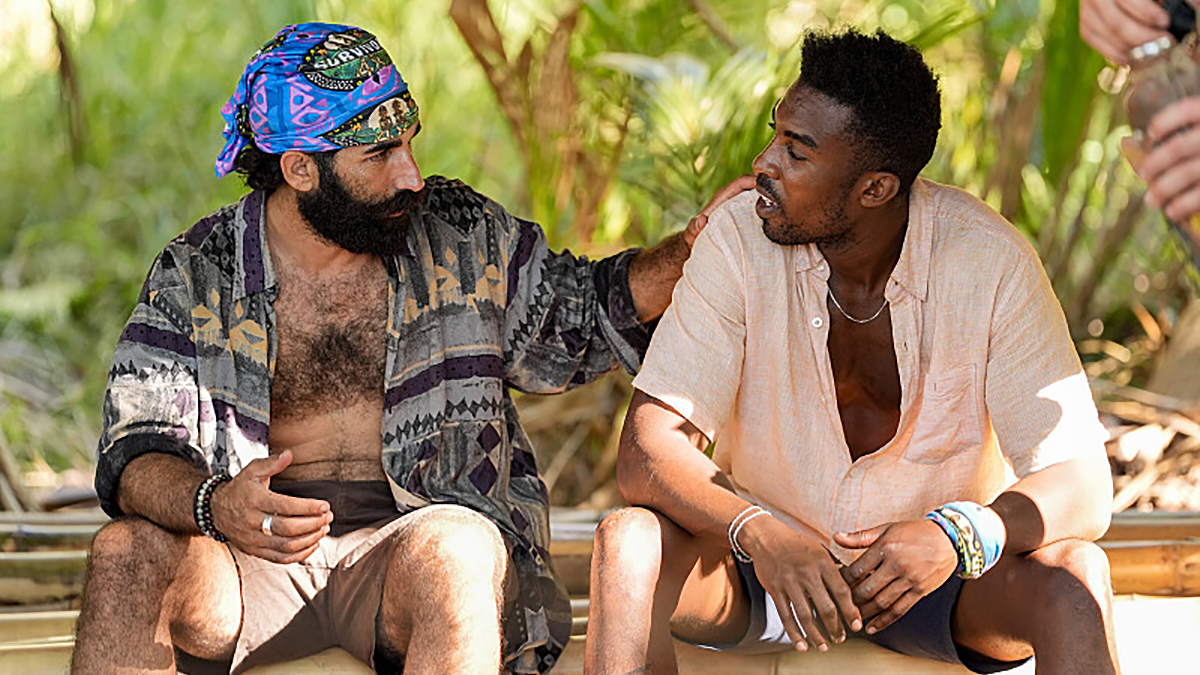
Shauhin Davari and Kyle Fraser. — Photo: Robert Voets/CBS.
Shauhin Davari: Shocked — and honestly, a little bit thrilled. Do you really want to go out in a boring way? No, you don’t. You want people to have to use every bell and whistle in their arsenal to take you out. That’s what you want. If you have to get voted out — which obviously, you don’t want — then at least let it be because someone took the stuff I pulled off of Tree Mail, the random stuff I grabbed off the thing, and turned it into a full-blown lie that ended up sending me home. Amazing. Truly. Thanks, y’all. That was fun — and well done. I respect good gameplay. It was an incredible move, expertly executed, with timing that couldn’t have been better.
John Powell: Obviously you can’t tell us who you voted for but when you were a part of the jury what were some of the things you were thinking when deciding on a winner?
Shauhin Davari: Okay, so I want to know the intentionality behind the moves people made — and how those moves served their overall narrative of a game-winning game. Everybody out there is crafting a story in their mind about what their winning game looks like, and now, your moves have to align with that. That’s something I think fans sometimes miss about Survivor: making moves just to make moves is a surefire way to go home. Making moves because you believe they put you in the best position to win — that’s what I want to hear about.
And then I want to hear accountability. You hear me take accountability for my game — I want to hear the same from them. What did they use? What was in their arsenal? What was going on in their head? Why did they do what they did? What mistakes did they make? What went wrong? And how did they adapt? That’s what I’m looking for as a juror.
And I also wanted them to know that I wasn’t bitter, right? I said, “Good game. Congratulations. You voted out the best player.” And I meant that. I genuinely felt like I was the best player left at that point. Not the best player overall — clearly, I got voted out, let’s be honest — but at the time I left, I felt like I was playing the best game. And I wanted them to know that I wasn’t going to bring bitterness to the jury.
Especially after watching David, and how Zoolander-y he had been throughout his game experience, I wanted to be different. I wanted them to know I was coming in with an open mind. I wanted everyone to have the chance to make their argument for why they should win — because I do believe you win the game at Final Tribal Council, not before it.
John Powell: Is there anything that you wish, whether it was talk with someone, strategy, a move you made? Is there anything that you wish fans would have seen about your journey?
Shauhin Davari: You know, obviously, they have to tell the story of 18 people — so, with full respect to that, I was responsible for a bit more out there than I think the fans really saw. And on top of that, the fans did see certain things — but they didn’t give me credit for them.
For example: the David vote. I got very little credit online — which, to be clear, doesn’t matter much to me — but I got very little credit for something I set up over the course of three or four days. And what’s missing from that conversation is this: I already had a ton of heat on me at the time. Remember, I caught votes at the Cedrek vote. Chrissy voted for me too, and she was throwing my name around.
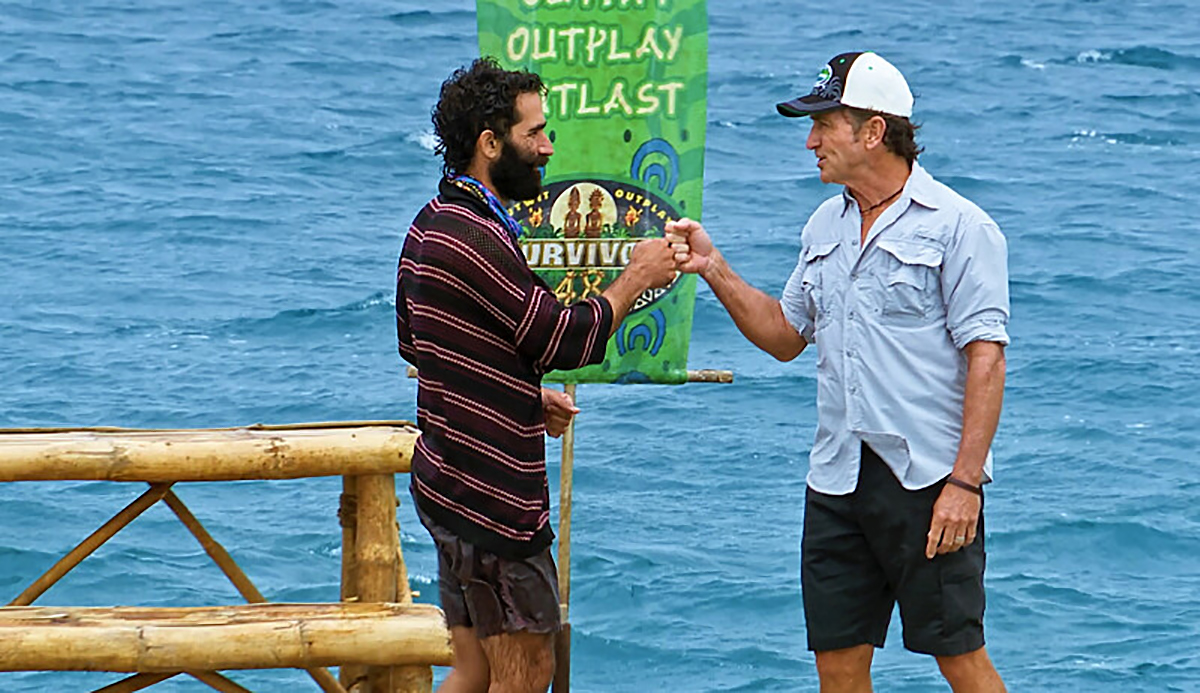
Shauhin Davari and Jeff Probst. Photo: CBS.
So in a moment when I already had a target on my back, I was still responsible for moving the game forward — not just with the David vote, but again right after that. When the vote turned to Mary, I played a major role there too. That conversation I had with Joe? I wasn’t pushing him super hard. I was playing it like Inception — guiding him with carefully chosen questions, Socratic-style, asking, “But why should we do that?” until he arrived at the decision I wanted. And yet again, I didn’t get much credit for it but honestly? That’s exactly how you want to play Survivor.
You don’t want credit from the people in the game — you want it from the people out of the game and if you listen to their exit press, you’ll see they did give me that credit. When I got to Ponderosa, I got my flowers. Pulling up in the van, doors opening, and everyone standing there with a full standing ovation — that’s one of the coolest things our cast did.
They told me — and yeah, they could’ve been lying, because it’s still Survivor — but they said they would’ve voted for me to win the million dollars if I had made it to the end against anyone and that’s exactly how I felt in the game. Unfortunately, it’s also how the rest of the tribe started to feel. And that’s why I went home.
John Powell: Would you ever play again and you’re the debate guru so what would have been briefly your argument to the jury if you made it that far?
Shauhin Davari: Would I play again? Duh! Right now! Right now! Don’t even tell anyone — just fly me out to Fiji. I’ll start in the middle of season 49, I don’t care!
Obviously, I felt more alive out there than I have in my entire life. I lit up out there. I had a blast out there and you can see it — every single second. From taking deep breaths to opening my palms on the beach, to walking around Tribal Council like a kid in Toys “R” Us — I loved it. Every moment.
As for my Final Tribal Council speech, I would have explained that my game was built on Socratic consensus-building. I asked people what they wanted, listened, and helped build a consensus — so everyone felt like they were part of every vote. And you see that with Mitch in the last episode. He says, “At six, you told me we were going to make a move together.” He believed me — even though I had voted out all his allies. Why? Because I had genuine connections with him.
That, to me, is a persuasive argument. The people I worked with — even the ones I voted out — could feel like they were part of my game. That’s a winning argument.
Now, Final Tribal is an hour and a half long. I had so much more to say — it’s not like I’m ever at a loss for words when it comes to this stuff. But I also think my love of the game came across clearly. And that matters. Kyle picked me for reward because I brought good vibes. And that matters too — especially to the jury.
I think some of the players left in the game didn’t bring good vibes. And that does affect your experience out there. Most of us only get one shot at this — even me. It’s very likely I’ll only get one chance. So you want that shot to be joyful. This is a wild, intense, once-in-a-lifetime experience. So who brought the joy? Who brought the love?
Go back and watch the clips — I’m hugging people, dapping them up, congratulating them. That’s gameplay too. It’s overlooked, it’s underappreciated, but it’s so important — not for the fans, because they can’t feel the hug — but for the people out there. They feel that love. It’s easy for me. I love very easily. I want people to feel seen, feel special, feel heard. That’s my superpower.







